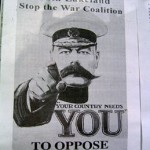Catching up on my emails after a short break in the Lake District, I find Thoughtcat’s West Drayton representative has sent a link to a story from ZNet’s fine round-up of Iraq commentaries about US marine Stephen Eagle Funk. He faces a court martial and probable prison sentence after refusing to fight on the basis that the war is “immoral because of the deception involved by our leaders”. Fantastic name, and, like e.e. cummings’ “conscientious object-or” Olaf, Funk is “more brave than me:more blond than you”.
I must admit I took advantage of the peace and quiet in the Lakes to avoid the news as best I could for a few days. Even so, I couldn’t avoid the war completely, either in the form of some terrifyingly loud training flypasts of fighter jets, or in more peaceful ways, as we found when we came upon this Quaker meeting hall while strolling through the pretty village of Ambleside…


